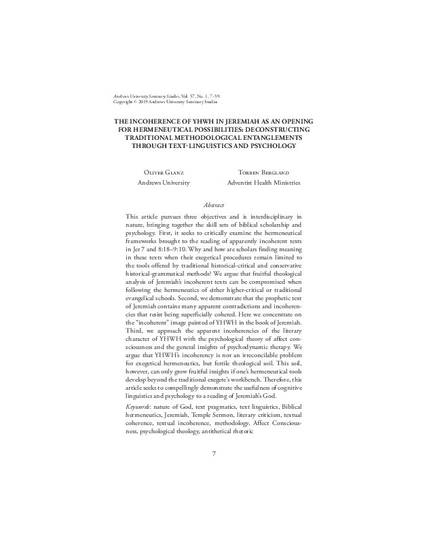
This article pursues three objectives and is interdisciplinary in nature, bringing together the skill sets of biblical scholarship and psychology. First, it seeks to critically examine the hermeneutical frameworks brought to the reading of apparently incoherent texts in Jer 7 and 8:18–9:10. Why and how are scholars finding meaning in these texts when their exegetical procedures remain limited to the tools offered by traditional historical-critical and conservative historical-grammatical methods? We argue that fruitful theological analysis of Jeremiah’s incoherent texts is compromised when following the hermeneutics of either higher-critical or traditional evangelical schools. Second, we demonstrate that the prophetic text of Jeremiah contains many apparent contradictions and incoherencies that resist being superficially cohered. Here we concentrate on the incoherent image painted of YHWH in the book of Jeremiah. Third, we approach the apparent incoherencies of the literary character of YHWH with the psychological theory of affect consciousness and the general insights of psychodynamic therapy. We argue that YHWH’s incoherency is not an irreconcilable problem for exegetical hermeneutics, but fertile theological soil. This soil, however, can only grow fruitful insights if one’s hermeneutical tools develop beyond the traditional exegete’s workbench. Therefore, this article seeks to compellingly demonstrate the usefulness of cognitive linguistics and cognitive literary studies to a reading of Jeremiah’s God.
Available at: http://works.bepress.com/oliver_glanz/38/
